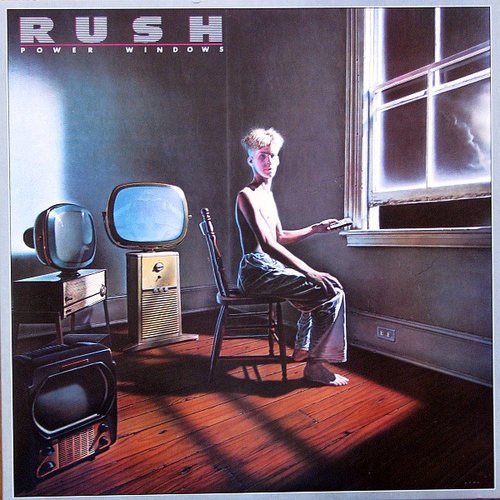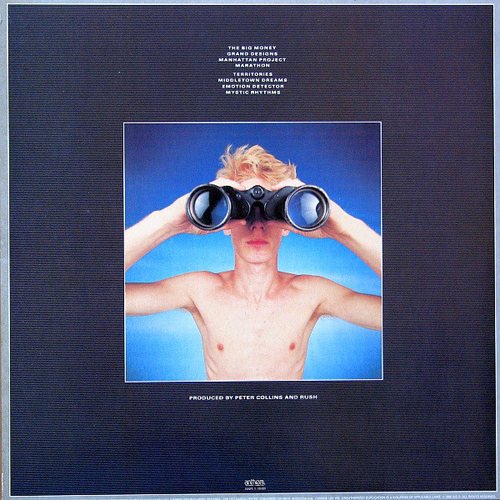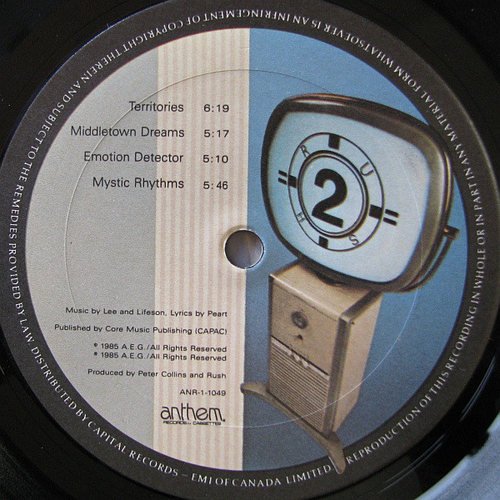RUSH - POWER WINDOWS: A Progger In Techno-Pop Clothing
As time has revealed, Signals and Grace Under Pressure were much more guitar-intensive than they got credit for at the time. Rush's move into synth-dominance really kicked in on Power Windows. It was their first teaming with English producer Peter Collins, who was previously known for high-tech pop and dance fare, and found the group giving their entire approach to recording a makeover: they recorded their tracks separately rather going for full-band takes, brought in outside keyboardist Andy Richards to aid with the synth programming, utilized an orchestra and a choir for the first time ever and generally went for a sleek, distinctly '80s sound that was more like the electronic pop of the era rather than the guitar-centric prog of old. A lot of fans blanched at these changes but a close listen to the album would reveal their worldview and ability to write powerful songs remained intact. Side one kicks off with one of Rush's most interesting post-Moving Pictures hits of the '80s, "The Big Money." This exploration of the control money exerts over society offers a crash-course in the album's sonic approach: synth frills in every nook, guitars that favor textures over leads, trebly but sturdy bass that adds a touch of analog, a combo of traditional and electronic drums and a mix that smoothes everything into a single plane of multitextured sleekness. "Grand Designs" reflects on the process of making records, mixing the arena rock of Lifeson's chugging riffs with a distinctly mid-'80s barrage of programmed, rhythmic synths. "Manhattan Project" is perhaps the album's most fully realized track, an account of the nuclear bomb's creation where subtle guitar and impressionistic synth shapes flesh out Peart's vivid lyrics. His drums set the pace and an orchestra comes in to boost the climax. "Marathon" ends the side in an epic way, with an elastic bassline providing the backbone for a meditation on the mixture of endurance and ephemeral joy involved in the titular pursuit. Its anthemic quality is completed by the addition of a choir in its final stages.
Side one kicks off with one of Rush's most interesting post-Moving Pictures hits of the '80s, "The Big Money." This exploration of the control money exerts over society offers a crash-course in the album's sonic approach: synth frills in every nook, guitars that favor textures over leads, trebly but sturdy bass that adds a touch of analog, a combo of traditional and electronic drums and a mix that smoothes everything into a single plane of multitextured sleekness. "Grand Designs" reflects on the process of making records, mixing the arena rock of Lifeson's chugging riffs with a distinctly mid-'80s barrage of programmed, rhythmic synths. "Manhattan Project" is perhaps the album's most fully realized track, an account of the nuclear bomb's creation where subtle guitar and impressionistic synth shapes flesh out Peart's vivid lyrics. His drums set the pace and an orchestra comes in to boost the climax. "Marathon" ends the side in an epic way, with an elastic bassline providing the backbone for a meditation on the mixture of endurance and ephemeral joy involved in the titular pursuit. Its anthemic quality is completed by the addition of a choir in its final stages. Side two opener "Territories" has Peart's best lyrics of the album, exploring the complexities of national identity and its tendency to create divisions among people. In a unique touch, Peart plays bongos here via sampling as Lifeson creates a variety of fluidly mellow and fast chiming riffs while Lee underpins it all with sturdy basswork and atmospheric washes of synth. "Middletown Dreams" utilizes skillfully-rendered vignettes to explore the sustaining power of dreams. The musical bed backing it alternates between percolating synth-pop verses and an atmospheric chorus that dreamily stretches out. "Emotion Detector" takes ballad-style lyrics and gives them a rock treatment, with perky, bass-accented verses whose light swing gives way to an impassioned, guitar riff-fueled chorus. "Mystic Rhythms" makes a stunning closer, proposing a sense of adventure in exploring the unknown that unites people across borders (a classic Rush theme). The band strips everything to the bare essentials here to back Lee's emotional vocals: just tribal drums, minimalist synth washes and undulating guitar and bass textures that unite to create a massive sound.
Side two opener "Territories" has Peart's best lyrics of the album, exploring the complexities of national identity and its tendency to create divisions among people. In a unique touch, Peart plays bongos here via sampling as Lifeson creates a variety of fluidly mellow and fast chiming riffs while Lee underpins it all with sturdy basswork and atmospheric washes of synth. "Middletown Dreams" utilizes skillfully-rendered vignettes to explore the sustaining power of dreams. The musical bed backing it alternates between percolating synth-pop verses and an atmospheric chorus that dreamily stretches out. "Emotion Detector" takes ballad-style lyrics and gives them a rock treatment, with perky, bass-accented verses whose light swing gives way to an impassioned, guitar riff-fueled chorus. "Mystic Rhythms" makes a stunning closer, proposing a sense of adventure in exploring the unknown that unites people across borders (a classic Rush theme). The band strips everything to the bare essentials here to back Lee's emotional vocals: just tribal drums, minimalist synth washes and undulating guitar and bass textures that unite to create a massive sound. Power Windows remains a bone of contention in Rush fan circles, with a noticeable number of fans considering it dated and feeling offended by the album's embrace of the '80s high-tech record-making approach. However, beneath the layers of gloss, the songs are strong, with memorable melodies and some of Peart's most thoughtfully-crafted lyrics. In subsequent years, the group has said they sought growth as arrangers and songwriters and what's in the grooves here accomplishes that. If you can come to terms with its sonic approach, it's a very rewarding listen - and it shows that the concept of progressive rock can take on forms that even its core fanbase might not recognize.
Power Windows remains a bone of contention in Rush fan circles, with a noticeable number of fans considering it dated and feeling offended by the album's embrace of the '80s high-tech record-making approach. However, beneath the layers of gloss, the songs are strong, with memorable melodies and some of Peart's most thoughtfully-crafted lyrics. In subsequent years, the group has said they sought growth as arrangers and songwriters and what's in the grooves here accomplishes that. If you can come to terms with its sonic approach, it's a very rewarding listen - and it shows that the concept of progressive rock can take on forms that even its core fanbase might not recognize.


